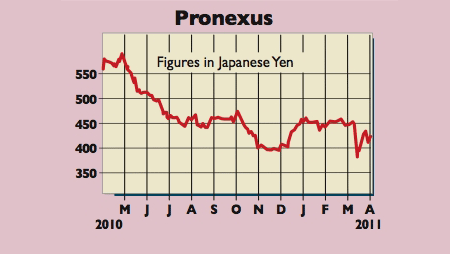
Demand for fresh capital from corporations has surged in Japan since the earthquake, as reconstruction efforts start to rebuild damaged infrastructure. One business set to profit from any uptick in fund raisings is Pronexus.
Pronexus is the country’s biggest provider of statutory documents – such as quarterly reports, listing particulars and prospectuses, which are used for rights issues and placings. The company enjoys a 60% share of a duopoly market, which in effect it carves up with Takara Printing. Pronexus is a family-run (30% stake) company that’s been going for 80 years and has suffered recently due to the general malaise in Japan and a lack of initial public offerings.
However, this is a feast-and-famine industry. With new international accounting standards for companies scheduled to be implemented by 2015, the medium-term picture appears much brighter. What’s more, the balance sheet is rock solid (net cash of ¥9.3bn partly offset by a ¥860m pension deficit). Customer retention rates are also high and repeat business typically accounts for 70% of total revenues at ¥19.5bn (or £145m). The stock thus offers good earnings visibility, as well as offering a nice 5% dividend yield.
Pronexus (Tokyo: 7893)
That said, 2010 was characterised by a whole heap of one-off charges that have dragged on performance. For instance, changes to the company pension scheme, and the relocation of its main printing site to just outside of Tokyo, mean that earnings before interest, tax and amortisation (EBITA) margins will fall to 8.2% for the year ending March 2011. That’s compared to a ten-year average of over 13.5%. Personally, I would rate the stock on a sustainable EBITA multiple of eight (assuming a 10% margin). After adding back the cash hoard, that suggests a fair value of about ¥600 per share (or 445p).
Investors should note that the number of listed stocks on the Nikkei has been in gradual decline, while those remaining on the list are seeking to cut costs. But despite these challenges, Pronexus offers excellent upside and should benefit from clients having to raise cash in the wake of last month’s natural disaster. Since its main offices and factory are located near Tokyo, the firm should be largely unaffected by the disaster.